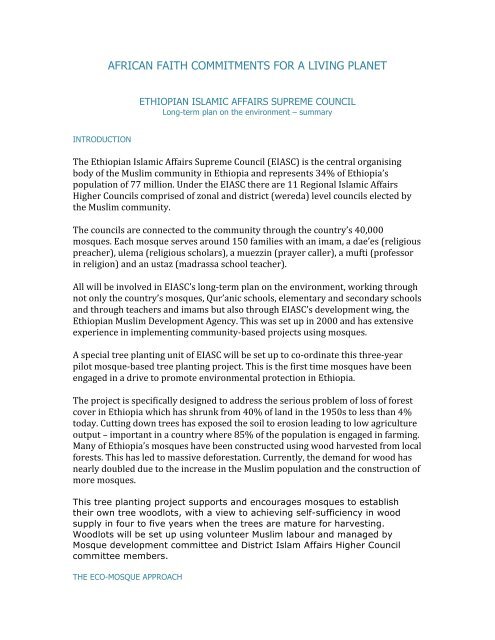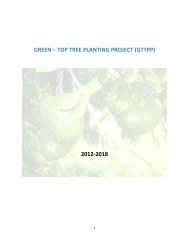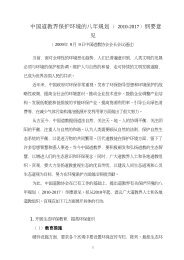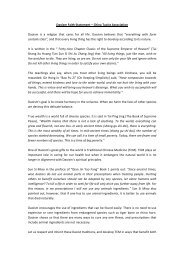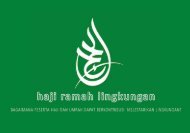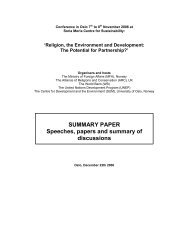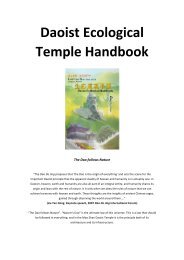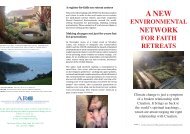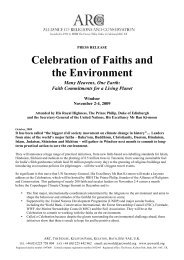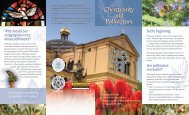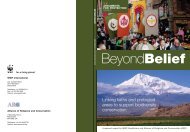Ethiopian Islamic Affairs Supreme Council - Alliance of Religions ...
Ethiopian Islamic Affairs Supreme Council - Alliance of Religions ...
Ethiopian Islamic Affairs Supreme Council - Alliance of Religions ...
You also want an ePaper? Increase the reach of your titles
YUMPU automatically turns print PDFs into web optimized ePapers that Google loves.
AFRICAN FAITH COMMITMENTS FOR A LIVING PLANET<br />
ETHIOPIAN ISLAMIC AFFAIRS SUPREME COUNCIL<br />
Long-term plan on the environment – summary<br />
INTRODUCTION<br />
The <strong>Ethiopian</strong> <strong>Islamic</strong> <strong>Affairs</strong> <strong>Supreme</strong> <strong>Council</strong> (EIASC) is the central organising <br />
body <strong>of</strong> the Muslim community in Ethiopia and represents 34% <strong>of</strong> Ethiopia’s <br />
population <strong>of</strong> 77 million. Under the EIASC there are 11 Regional <strong>Islamic</strong> <strong>Affairs</strong> <br />
Higher <strong>Council</strong>s comprised <strong>of</strong> zonal and district (wereda) level councils elected by <br />
the Muslim community. <br />
The councils are connected to the community through the country’s 40,000 <br />
mosques. Each mosque serves around 150 families with an imam, a dae’es (religious <br />
preacher), ulema (religious scholars), a muezzin (prayer caller), a mufti (pr<strong>of</strong>essor <br />
in religion) and an ustaz (madrassa school teacher). <br />
All will be involved in EIASC’s long-‐term plan on the environment, working through <br />
not only the country’s mosques, Qur’anic schools, elementary and secondary schools <br />
and through teachers and imams but also through EIASC’s development wing, the <br />
<strong>Ethiopian</strong> Muslim Development Agency. This was set up in 2000 and has extensive <br />
experience in implementing community-‐based projects using mosques. <br />
A special tree planting unit <strong>of</strong> EIASC will be set up to co-‐ordinate this three-‐year <br />
pilot mosque-‐based tree planting project. This is the first time mosques have been <br />
engaged in a drive to promote environmental protection in Ethiopia. <br />
The project is specifically designed to address the serious problem <strong>of</strong> loss <strong>of</strong> forest <br />
cover in Ethiopia which has shrunk from 40% <strong>of</strong> land in the 1950s to less than 4% <br />
today. Cutting down trees has exposed the soil to erosion leading to low agriculture <br />
output – important in a country where 85% <strong>of</strong> the population is engaged in farming. <br />
Many <strong>of</strong> Ethiopia’s mosques have been constructed using wood harvested from local <br />
forests. This has led to massive deforestation. Currently, the demand for wood has <br />
nearly doubled due to the increase in the Muslim population and the construction <strong>of</strong> <br />
more mosques. <br />
This tree planting project supports and encourages mosques to establish<br />
their own tree woodlots, with a view to achieving self-sufficiency in wood<br />
supply in four to five years when the trees are mature for harvesting.<br />
Woodlots will be set up using volunteer Muslim labour and managed by<br />
Mosque development committee and District Islam <strong>Affairs</strong> Higher <strong>Council</strong><br />
committee members.<br />
THE ECO-MOSQUE APPROACH
The programme will be piloted in 30 selected mosques in six districts<br />
(wereda) <strong>of</strong> three regions <strong>of</strong> Ethiopia and is designed to be replicated<br />
through other areas and scaled up once shown to be successful. It will be<br />
underpinned by three days <strong>of</strong> national level training in environmental<br />
protection for 100 selected Muslim leaders, mosque imams, and mosque<br />
development committee representatives from the three target regions. In<br />
addition there will be three days <strong>of</strong> training for 25 imams in each <strong>of</strong> the<br />
target districts.<br />
OUTCOMES<br />
The programme aims to have a conservation education network operating in<br />
selected mosques throughout the country which will also provide the Muslim<br />
community with a large amount <strong>of</strong> non-timber forest products, encourage<br />
ecotourism and help improve the livelihoods <strong>of</strong> the local population.<br />
In addition, tree planting at the mosques will help to protect water supplies<br />
and secure biodiversity, and more than 3,000 community leaders will have<br />
greater awareness about deforestation, climate change and practical<br />
conservation knowledge. Through the tree planting and environmental<br />
workshops coordinated by EIASC, low-income women will have the<br />
opportunity to develop skills in gardening and tree planting.<br />
ACTIONS<br />
• Create a Tree Day each year. Tree Day would be celebrated in each<br />
selected mosque with activities such as drama and art to promote a culture<br />
<strong>of</strong> conservation in Muslim communities as well as fundraising for Eco-Mosque<br />
activities. This would also be a day <strong>of</strong> tree planting with teaching on the<br />
importance <strong>of</strong> tree conservation, tree planting and tree care;<br />
• Create an annual conservation walk for Muslim communities;<br />
• Hold one-day training workshops in mosques to educate Muslim leaders<br />
about the role <strong>of</strong> trees in environmental conservation. Muslim leaders and<br />
communities will form small groups <strong>of</strong> five people to undertake tree planting<br />
around the mosque and set up an environment club to co-ordinate activities.<br />
Each mosque will plant 10,000 trees over two to three years;<br />
• Establish a plant nursery and planting <strong>of</strong> fruit trees at mosque level. Each<br />
tree nursery will be supported by a water source through a water pump and<br />
water tanks;<br />
• Distribute education material on the environment and establish an<br />
environmental conservation education programme in the mosques. Use<br />
Friday sermons and religious holidays such as the two Eid al-Fitr (during the<br />
Ramadan fast break and Arafa Adha) and public gatherings to talk about the<br />
importance <strong>of</strong> protecting the environment. Materials to be produced in local<br />
languages and to reflect <strong>Islamic</strong> principles and values. Guidelines on the<br />
environment to be prepared and distributed to imams to educate the<br />
community;
• Establish a model eco mosque where agr<strong>of</strong>orestry methods such as alley<br />
cropping, live fencing, woodlots and windbreaks will be demonstrated;<br />
• Educate communities about agr<strong>of</strong>orestry practices through workshops and<br />
seminars;<br />
• Promote vegetable gardening for 2,700 vulnerable low-income women at<br />
the mosques, providing training and native vegetable seeds;<br />
• Establish a primary school student’s environment protection club and mini<br />
media centre at district level;<br />
• Set up an annual learning visit to successful tree planting projects<br />
elsewhere in Africa.<br />
The three-year plan has been drawn up by EIASC and endorsed by the<br />
<strong>Ethiopian</strong> Ulema <strong>Council</strong>.<br />
This plan was launched at ARC’s Many Heavens, One Earth, Our Continent celebration held in Nairobi,<br />
Kenya, in September 2012


